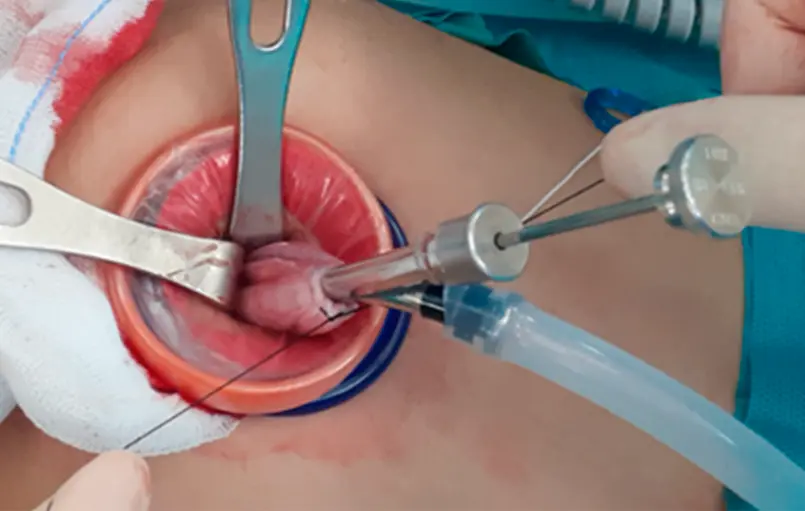OVARIAN CYST
TREATMENT
In Mumbai

An ovarian cyst can create a snicking time bomb in your body! Ovarian cysts are dermatological sacs that can be formed inside or on your ovaries. A few cysts are non-dangerous and settle on their own. But hold on! Some cysts can lead to several difficulties and be a severe health concern if ignored.
Imagine experiencing normal bloating and abdominal pain for a few months. However, you ignored it, thinking it was only a stomach problem. But what if the pain becomes intolerable, and you decide to visit the doctor and come to know you are diagnosed with a huge ovarian cyst?
Later, this sizable cyst can even form cancer, and many threatening problems can occur. To avoid such situations, seeking a doctor’s attention on time is essential. And to help you with that, let’s dive into this article to learn about ovarian cyst treatment in Mumbai.
What is an ovarian cyst?
An ovarian cyst develops on or near the ovary. Most ovarian cysts are benign (non-cancerous) and cause no symptoms. However, ovarian cysts can cause pain, bleeding, or other problems. If you are dealing with an ovarian cyst, your doctor may recommend watchful waiting or surgery to remove the cyst. Surgery is also typically recommended if the cyst is cancerous or has burst. Ovarian cysts are common, especially during the childbearing years.
In most cases, they go away on their own without treatment. However, some women may need surgery to remove the cyst. Consult with a professional if you have any concerns about an ovarian cyst. They can help you understand your risks and make the right treatment plan.
What are the different forms of ovarian cysts?
Functional cysts are the most general type of ovarian cyst that evolves in your ovaries. These are formed because of the routine changes in your body during the menstrual cycle. Although, there are various cases in which ovarian cysts develop without connection to the menstrual cycle.
Functional ovarian cysts
Functional cysts can indicate that your ovaries are working as they should. They usually shrink after some time, generally within 40 to 60 days, without particular treatment.
There are two main types of functional cysts, and they are:
- A follicular cyst is a tiny sac inside your ovary, known as a follicle, that releases an egg every month as a phase of your menstrual cycle. Follicular cysts are formed when your follicle fails to release an egg, and rather your follicle fills with fluid and evolves bigger.
- Once your follicle releases an egg, it creates a hormone-generating cell group known as the corpus luteum. A cyst evolves when the fluid collects inside the corpus luteum, making it bigger.
Other types of ovarian cysts
Ovarian cysts are not always connected with your menstrual cycle and don’t always lead to a medical issue. Although, your gynecologist might need to check on them to ensure they don’t lead to any further problems. A few of the other types of ovarian cysts are:
- Cystadenomas- These ovarian cysts develop on the ovary surface. They might be filled with watery and thin fluid or mucous-like or thicker.
- Teratomas or dermoid cysts- These cysts contain cells that make up every type of tissue in your body, varying from teeth, brain, skin, and even hair tissue.
- Endometriomas- Endometrioma cysts consist of endometrial tissue, which you bleed monthly during menstruation.
- Ovarian cancer- is an intense form of ovarian cysts, including solid masses of cancer cells.
Who is usually affected by ovarian cysts?
Any woman can develop an ovarian cyst. Your risks increase depending on your:
- Pregnancy status- Ovarian cysts are more usually develop during pregnancy.
- Age- These cysts are generally seen in pre-menopausal women.
- Past with ovarian cysts- The chances of having ovarian cysts are higher if you’ve had one.
- Specific medical conditions- The chances of getting an ovarian cyst are higher if you are dealing with hormone issues, endometriosis, or taking a few medications to deal with ovulation. (Clomiphene).
What are the causes of ovarian cysts?
Ovulation is the primary cause of ovarian cysts. A few of the other reasons involve:
- Endometriosis- Such cysts usually develop on your ovary in the later phases of endometriosis.
- Uncommon cell reproduction- Abnormal cell reproduction can lead to ovarian cysts such as cystadenomas and dermoid.
- PID (Pelvic Inflammatory Disease)- Serious pelvic infections that can extend to the ovaries, causing cysts.
What are the symptoms of an ovarian cyst?
Some tiny cysts have no signs or symptoms. In such a case, you might not even know you have an ovarian cyst. The enormous cyst might lead to:
- Abdominal bloating- This is the most general symptom of an ovarian cyst.
- Painful menstruation- One more common sign of cyst is dysmenorrhea or painful menstruation. This is generally because of the pressure on your uterus due to the cyst.
- Pain during intercourse- Pain while intercourse might also occur due to an ovarian cyst. This is because it can put pressure on your reproductive organs.
- Lower abdomen pain- You might also feel pain in your lower abdomen because of the high pressure on the abdomen organs.
- Frequent urination- Frequent urination is another common symptom, as the cyst can press on your bladder. This might cause an urge to urinate frequently.
Consulting a professional healthcare provider is highly recommended if you experience these symptoms.
What is the diagnosing procedure for an ovarian cyst?
Your gynecologist will initially exclude pregnancy as the cause of your ovarian cyst. Then, they might use the below-listed tests to diagnose your ovarian cyst:
- A pelvic test- Your doctor will examine your pelvis internally for any differences or abnormalities.
- Ultrasound- The ultrasound imaging process utilizes sound waves to generate pictures of your body’s internal organs. This technology can identify ovarian cysts, recognize their precise location and differentiate between solid and fluid.
- Laparoscopy- Laparoscopy is carried out in an operating hall. Your doctor puts a camera through a cut inside your abdomen and can look at your pelvic cavity and reproductive organs. They can remove the cyst if it is detected now.
What is the available ovarian cyst treatment in Mumbai?
Treatment will be based on several aspects, such as your symptoms, age, and causes.
Watchful waiting
Functional cysts generally fade away without any need for treatment. Dr. Prashansa Raut might recommend a wait-and-watch approach if the cyst is functional. You might have to undergo an ultrasound in the upcoming weeks to check if your cyst has resolved.
Medications
Your doctor might provide hormone medications like birth control pills to cease ovulation and prevent future cysts from evolving.
What are the available options for ovarian cyst surgery in Mumbai?
If a cyst is getting bigger and causing severe symptoms, you might require surgery to get rid of it. The surgery type depends on your cyst’s size and how ultrasound displays it. Various surgical procedures are used, including laparoscopy, laparotomy, etc.

Note: If your gynecologist doubts cancer, they might suggest you a gynecological oncologist or a cancer specialist for the further treatment process.
FAQs
What is the ovarian cyst surgery cost in Mumbai?
The entire ovarian cyst surgery cost in Mumbai depends on several factors. You can contact Tasyah Clinic to learn more details about the procedure.
Is surgery the only option for managing ovarian cysts?
No, surgery is not always required for ovarian cysts. In a few scenarios, your doctor might recommend pain medication or hormone therapy to treat symptoms and shrink the cyst.
What are the risks involved in ovarian cyst surgery?
Every surgical procedure carries risks, and the same goes for ovarian cyst surgery in Mumbai—threats such as damage to surrounding organs, infection, and bleeding.
Can ovarian cysts come back after surgery?
Yes, they might come back even after the surgery. Although, the possibility of recurrence is based on many aspects, like cyst type and if or not both of your ovaries were removed.
Which is the best place for ovarian cyst treatment in Mumbai?
Suppose you are dealing with ovarian cysts. Who knows how disruptive and painful they are better than you! But you don’t need to suffer it alone. Dr. Prashansa Raut, an experienced gynecologist at Tasyah Clinic, is here to offer you the compassionate and comprehensive care you need to handle your ovarian cysts. Our team will work with you to provide a customized treatment plan that determines your unique requirements and relieves you from severe symptoms. You can also count on us for the best ovarian cyst surgery in Mumbai.
With the latest and advanced technology, you can trust us for quality ovarian cyst treatment in Mumbai. Please consult with us today to book your appointment and take a big step toward a pain-free life.

Your Health Matters!!
Let us help you achieve optimal wellness
with our comprehensive women’s healthcare services
